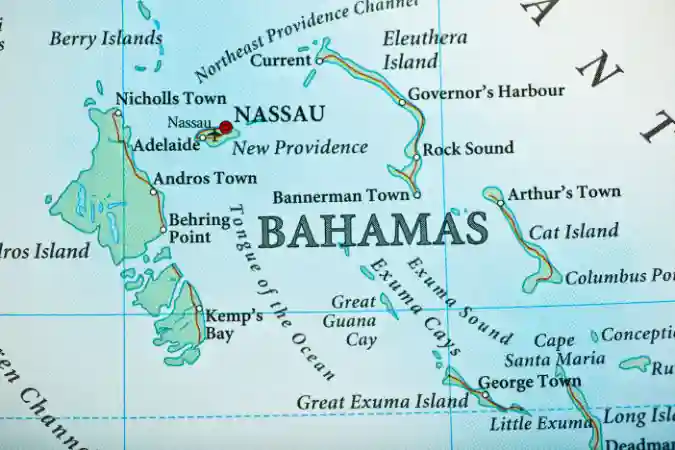For individuals with a felony conviction on their record, navigating international travel can present unique challenges and uncertainties. One common question that arises is whether felons can visit the picturesque islands of the Bahamas. Understanding the entry requirements, immigration laws, and potential obstacles faced by felons seeking to travel to the Bahamas is crucial for informed decision-making and planning.
We plan to help examine the intricacies of felons visiting the Bahamas, exploring the legal framework, factors influencing entry eligibility, the application process, and available resources for support.
Can Felons Visit The Bahamas?

All travelers must have a valid passport to enter the Bahamas. Additionally, travelers from countries that require a visa to enter the Bahamas must have a valid visa.
Visitors from the United States, Canada, the United Kingdom, and many other countries are allowed to stay in the Bahamas for up to 90 days without a visa. However, travelers must have a return ticket and proof of sufficient funds for their stay.
Travelers must also complete a Travel Health Visa application before entering the Bahamas. This application includes providing proof of a negative COVID-19 test taken within five days before arrival.
It is important to check the most up-to-date entry requirements before traveling to the Bahamas, as they may change due to the ongoing COVID-19 pandemic.
Entry Restrictions For Felons Traveling To The Bahamas
Felons traveling to the Bahamas are subject to entry restrictions, including the following:
- Felons are required to disclose their criminal history on their visa application or arrival card.
- Felons with a history of serious crimes, such as drug trafficking or violent offenses, may be denied entry into the Bahamas.
- Felons may be subject to additional scrutiny by immigration officials upon arrival in the Bahamas.
- Felons with outstanding warrants or pending criminal charges may be detained and deported.
- Felons who have served their sentence and have a valid passport and travel documents may be allowed entry into the Bahamas but may be subject to additional checks and questioning.
Felons need to be honest about their criminal history and cooperate with immigration officials when traveling to the Bahamas to avoid any issues or complications during their trip.
Can A Felon Travel To The Bahamas On A Cruise?
Felons may be able to travel to the Bahamas on a cruise, but they should be aware of certain restrictions and considerations:
- Cruise lines may have their policies regarding passengers with criminal records. Felons need to check with the cruise line they plan to travel with to see if there are any restrictions on passengers with criminal histories.
- The Bahamas may have its entry restrictions for felons, as mentioned in the previous response. It is recommended that felons check with Bahamian authorities or their cruise line to confirm the entry requirements before booking a cruise to the Bahamas.
- Felons should be prepared to disclose their criminal history on their visa application or arrival card when arriving in the Bahamas, whether by cruise or other means of transportation.
- Felons who are on probation or parole may need permission from their supervising officer to travel out of the country, including on a cruise to the Bahamas.
Overall, felons should do their due diligence and research the specific requirements and restrictions for traveling to the Bahamas on a cruise to ensure a smooth and hassle-free travel experience.
Can One Go To The Bahamas With A Felony Sex Offense?
Individuals with a felony sex offense may potentially be denied entry into the Bahamas. The Bahamas government has strict entry requirements for individuals with criminal records, and this may include denying entry to those with felony convictions, particularly for serious offenses like sexual offenses. It is recommended to contact the Bahamian embassy or consulate to inquire about their specific policies and requirements for individuals with felony convictions before attempting to travel to the Bahamas.
Factors Impacting An Offenders’ Ability To Visit Bahamas
1. Criminal Record
Felons with a criminal record may be denied entry to the Bahamas based on the severity and nature of their crime.
2. Visa Requirements
Felons may face stricter visa requirements, such as background checks when applying for entry into the Bahamas.
3. Travel Restrictions
Some felons may be subject to travel restrictions that prevent them from visiting certain countries, including the Bahamas.
4. Immigration Laws
The Bahamas has strict immigration laws that may prohibit felons from entering the country.
5. Travel History
Felons with a history of illegal entry into other countries may face increased scrutiny when trying to enter the Bahamas.
6. Security Concerns
The Bahamas may have concerns about potential safety or security risks posed by felons entering the country.
7. Length Of Time Since Conviction
The length of time since a felon’s conviction may impact their ability to visit the Bahamas, as some countries have regulations regarding the time frame within which certain convictions can disqualify individuals from entry.
8. Rehabilitation
In some cases, felons who have completed rehabilitation programs or shown evidence of good behavior may have a greater chance of being allowed to go to the Bahamas.
Process For Felons Seeking Entry Into Bahamas

Individuals who have been convicted of a felony may face difficulties when trying to enter the Bahamas. The country has strict entry requirements and may deny entry to individuals with a criminal record. However, there are steps that felons can take to improve their chances of being allowed entry into the Bahamas.
1. Obtain A Valid Passport
All travelers to the Bahamas, including felons, must have a valid passport. Ensure that your passport is up to date and not expired before attempting to enter the country.
2. Contact The Bahamas Immigration Department
If you have a felony conviction on your record, it is advisable to contact the Bahamas Immigration Department before booking your trip. You can explain your situation and provide any relevant documentation, such as court records or a letter of good conduct, to support your case.
3. Apply For A Visa
Depending on your country of citizenship, you may need to apply for a visa to enter the Bahamas. Felons may have a better chance of being granted a visa if they can demonstrate that they have been rehabilitated and are unlikely to pose a threat to the country.
4. Be Honest About Your Criminal History
It is important to be truthful about your criminal history when applying for entry into the Bahamas. Providing false information could result in being denied entry or even facing legal consequences.
5. Seek Legal Advice
If you are unsure about the implications of your felony conviction on your ability to enter the Bahamas, consider seeking legal advice from an immigration attorney. They can guide the steps you can take to improve your chances of being allowed entry into the country.
6. Follow The Entry Requirements
Make sure to comply with all entry requirements set by the Bahamas government, such as having a return ticket, proof of accommodation, and sufficient funds for your stay. Failure to meet these requirements could result in being denied entry.
Finally, felons seeking entry into the Bahamas should be prepared to provide evidence of their rehabilitation and demonstrate that they are not a threat to the country. By taking the necessary steps and following the guidelines set by the Bahamas government, felons may have a better chance of being allowed entry into the country.
Understanding Bahamian Immigration Laws For Felons
The Bahamas has strict immigration laws regarding felons seeking entry into the country. Felons are generally not allowed to enter the Bahamas, and individuals with a criminal record may be denied entry at the border.
According to the Immigration Act of the Bahamas, individuals who have been convicted of a felony offense are considered inadmissible to the country. This includes both violent and non-violent offenses. Immigration authorities may detain felons attempting to enter the Bahamas and face deportation.
However, individuals with a criminal record who wish to visit the Bahamas may be able to apply for a waiver of inadmissibility. This waiver is granted at the discretion of Bahamian authorities and is not guaranteed. Those seeking a waiver of inadmissibility must provide evidence of rehabilitation, such as completion of a rehabilitation program or a period of good behavior.
Felons need to be honest about their criminal history when applying for entry to the Bahamas. Providing false information on immigration forms can result in further consequences, including permanent inadmissibility to the country.
Lastly, it is important for felons to be aware of Bahamian immigration laws and to understand the potential consequences of attempting to enter the country with a criminal record. It is recommended that you consult with an immigration attorney before making any travel plans to the Bahamas.
Are There Resources Available To Help Felons Navigate The Process Of Traveling To The Bahamas With Felony Conviction
Yes, there are resources available to help felons navigate the process of traveling to the Bahamas with a felony conviction.
1. Contacting The Bahamas Embassy Or Consulate
The Embassy or Consulate of the Bahamas in your country may be able to provide information on the visa requirements and restrictions for individuals with felony convictions.
2. Legal Assistance
Consulting with a lawyer who specializes in international travel and immigration law may help you understand the specific regulations and requirements for traveling to the Bahamas with a felony conviction.
3. Online Resources
There are various online forums and websites where individuals share their experiences and tips on traveling to the Bahamas with a felony conviction. These resources can provide valuable information and insights on navigating the process.
4. Support Organizations
Some organizations support and assist individuals with felony convictions seeking to travel internationally. These organizations may be able to offer guidance and resources to help facilitate your trip to the Bahamas.
It is important to research and fully understand the visa requirements and restrictions for individuals with felony convictions before planning your trip to the Bahamas. Consulting with legal professionals and utilizing available resources can help ensure a smooth and successful travel experience.
See related posts:
Countries you can’t visit with a felony
Summary

Offenders can visit the Bahamas but may be subject to additional scrutiny and restrictions due to their criminal record. It is important for felons to research and understand the visa requirements and restrictions for individuals with felony convictions before planning their trip. Consulting with legal professionals, contacting the Bahamas Embassy or Consulate, and utilizing online resources and support organizations can help felons navigate traveling to the Bahamas with a felony conviction.
In summary, you can visit the Bahamas, but you may be subject to additional scrutiny and restrictions due to your criminal record. It is important for felons to research and understand the visa requirements and restrictions for individuals with felony convictions before planning their trip. Consulting with legal professionals, contacting the Bahamas Embassy or Consulate, and utilizing online resources and support organizations can help felons navigate traveling to the Bahamas with a felony conviction.